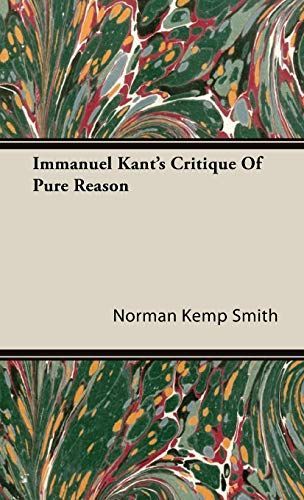
Immanuel Kant's Critique of Pure Reason
IMMANUEL KANTS CRITIQUE OF PURE REASON translated by NORMAN KEMP SMITH. Originally published in 1929. PREFACE: THE present translation was begun in 1913, when I was com pleting my Commentary to Kants Critique of Pure Reason Owing, however, to various causes, I was unable at that time to do more than prepare a rough translation of about a third of the whole and it was not until 1927 that I found leisure to revise and continue it. In this task I have greatly profited by the work of my two predecessors, J. M. D. Meiklejohn and Max Muller. Meiklejohns work, a translation of the second edition of the Critique was published in 1855. Max Miillers translation, which is based on the first edition of the Critique, with the second edition passages in appendices, was published in 1 88 1. Meiklejohn has a happy gift which only those who attempt to follow in his steps can, I think, fully appreciate of making Kant speak in language that reasonably approxi mates to English idiom. Max Miillers main merit, as he has very justly claimed, is his greater accuracy in render ing passages in which a specially exact appreciation of the niceties of German idiom happens to be important for the sense. Both Meiklejohn and Max Miiller laboured, however, under the disadvantage of not having made any very thorough study of the Critical Philosophy and the shortcomings in their translations can usually be traced to this cause. In the past fifty years, also, much has been done in the study and interpretation of the text. In particular, my task has been facilitated by the quite invaluable edition of the Critique edited by Dr. Raymund Schmidt. Indeed, the ap pearance of this edition in 1926 was the immediate occasion of my resuming the work of translation. Dr. Schmidts restoration of the original texts of the first and second editions of the Critique, and especially of Kants own punctuation so very helpful in many difficult and doubtful passages and his cita tion of alternative readings, have largely relieved me of the time-consuming task of collating texts, and of assembling the emendations suggested by Kantian scholars in their editions of the Critique or in their writings upon it. The text which I have followed is that of the second edition i 787 and I have in all cases indicated any departure from it. I have also given a translation of all first edition passages which in the second edition have been either altered or omitted. Wherever possible, this original first edition text is given in the lower part of the page. In the two sections, however, which Kant completely recast in the second edition The Transcendental Deduction of the Categories and The Paralogisms of Pure Reason this cannot conveniently be done and I have therefore given the two versions in immediate succession, in the main text. For this somewhat unusual procedure there is a twofold justification first, that the Critique is already, in itself, a composite work, the different parts of which record the successive stages in the development of Kants views and secondly, that the first edition versions are, as a matter of fact, indispensable for an adequate under standing of the versions which were substituted for them. The pagings of both the first and the second edition are given throughout, on the margins the first edition being referred to as A, the second edition as B. Kants German, even when judged by German standards, makes difficult reading. The difficulties are not due merely to the abstruseness of the doctrines which Kant is endeavouring to expound, or to his frequent alternation between conflicting points of view. Many of the difficulties are due simply to his manner of writing...